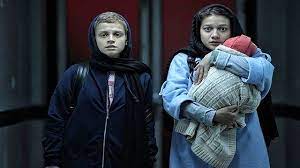previously published on Asian Movie Pulse
One could hardly associate Iran with snow and frost, but the two actually dominate the landscape of Nahid Sedigh’s feature debut “Cold Sigh”. Such “looks”, combined with the ethical dilemma as its certain topic and the elevated genre flavours with the motifs of a road movie and backwoods noir would normally ensure that the film travels the festival circuit after the premiere at Fajr back in 2023, which in a way happened, but not to the expected gatherings.
After the flash-forward opening shot that finally gets its meaning at the end of the film, we meet our protagonist Baha (Iman Sedigh) asleep in his old pick-up truck that got stuck in the wet snow. His uncle comes to his assistance, but he also informs him that the man called Bahram will be soon released. We learn that Bahram served the 20-year sentence for murder and his crime affected the whole village, especially Baha. However, Baha volunteers to pick him up and give him ride home…
Once he does so, the two start the long ride in complete silence that is only broken by Baha’s order that smoking is not allowed inside the cabin, meaning that Bahram (the veteran Ali Bagheri) has to wait for the pause for smoking. There would be plenty of pauses, since some roads are closed due to the weather conditions and, for the same reason, the improvised gas stations are out of fuel officially, but the owners might be interested in selling their own stash at higher prices. While Baha debates with himself whether to simply execute Bahram for the sins he committed or just to leave him in the harm’s way, we learn a thing or two about the relation and the history between them…
While the topics of the moral dilemma and navigating the rough social landscape are the staple diet of the American neo-westerns, rural thrillers and backwoods noirs, and the slow-moving, obstacle-ridden road movie serves as the metaphor of hardly getting anywhere in life, the question is whether the bare-bones plot and the wrapping of mystery of the initial relationship between the two main characters could drive the film across the finish line. It appears that Nahid Sedigh would be more than successful in the first two thirds of the film, due his sense of style to make “Cold Sigh” appear quite a unique genre blender and also for the storytelling in which the crucial pieces of information are given to us in drip-like quantities. However, once all the cards are on the table, it inevitably runs out of gas, much like Baha’s old Toyota.
Even so, there is still much to enjoy in “Cold Sigh”. For instance, the director lays the ground for the two actors to engage in micro-acting competition of playing the strong and silent types where Iman Sedigh is a worthy adversary to the masterful Ali Bagheri, while the rest of the actors playing the bit roles follow their cues. Nahid Sedigh also controls the visual aspect of the film mixing the flavours of the authentic Iranian cinema (shots inside the car while driving, barren landscapes) with those from the western and northern influences, and the execution of his wishes by the cinematographer Masoud Amini Tirani and the editor Pooyan Sholevar is spot-on. The audio components also work well in the synergy of Hassan Mahdavi’s discreet sound design and the short, well-timed passages of orchestration in Foad Ghahremani’s score.
Maybe the too-revealing plot descriptions both online and in the festival catalogues, as well as opening shot and the “mileage” of the viewer in the terms of the genres spoil the pleasures of seeing “Cold Sigh” for the first time. But still, it is quite an enjoyable experience.







